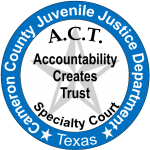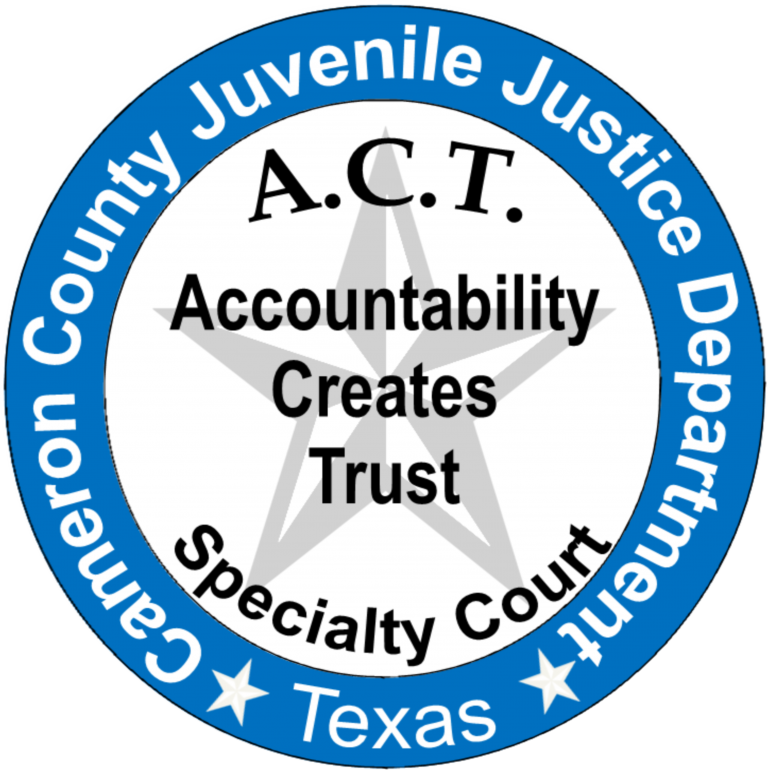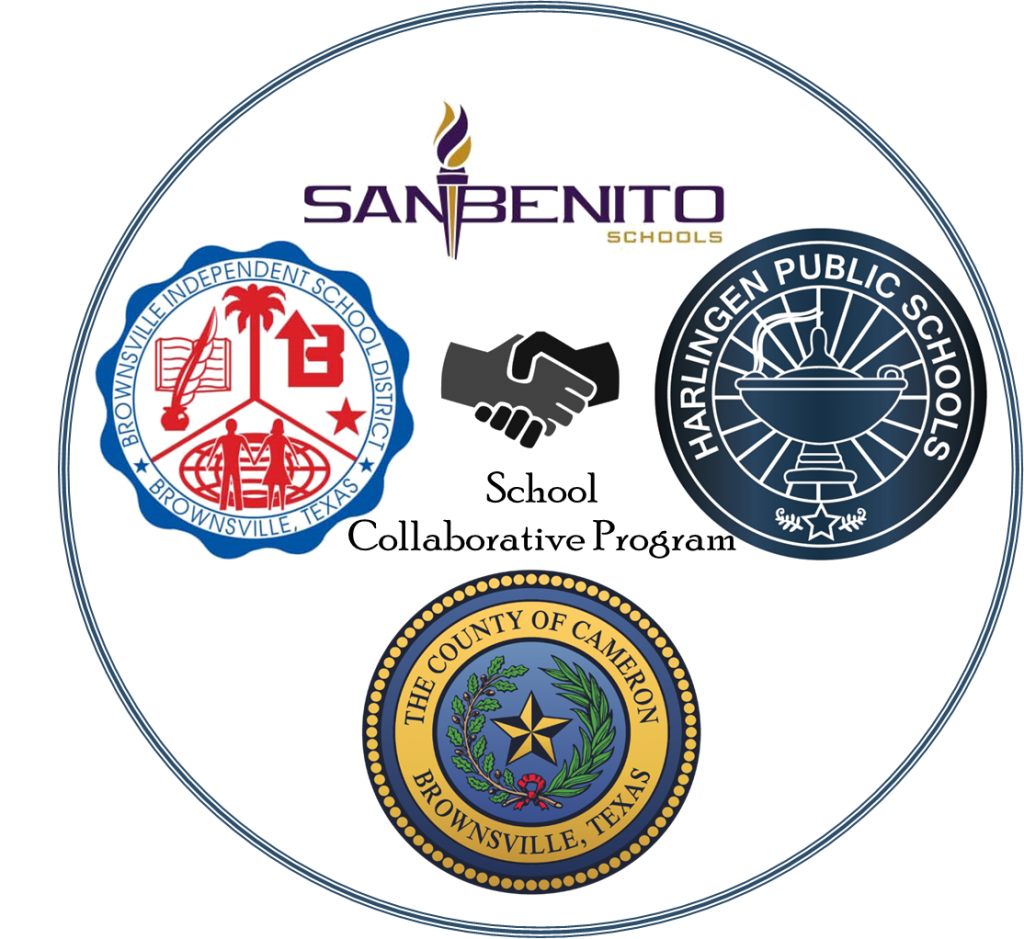

The Cameron County Juvenile Justice Department (CCJJD) offers innovative programs and probation services to better serve our youth.
Contingent on the child’s age, as well as risks and needs, the department provides prevention, intervention and treatment services to best address the overall well-being of the youth and ensure safety and security for the community.
CCJJD tries to meet the complex needs of juveniles/families by not only holding juveniles accountable, but also providing them opportunities. The department prides itself with leveraging resources with local school districts, non-profit organizations and securing grants to help provide specialized services.
Certified Juvenile Probation Officers (JPO) are responsible for supervising juvenile offenders who are either pending court or adjudicated and placed on probation. Each youth is assigned a JPO who monitors compliance and helps re-direct the youth to a positive track by connecting him to resources. If the youth does not comply with the conditions of probation, commits a new offense, or has a significant history of offenses, the Court may impose consequences (i.e. extension of probation, community service, electronic monitor, etc.) to include removal from their home and reside in a long-term residential facility. The department also has certified Community Activity Officers (CAO) to assist with monitoring probation compliance (i.e. curfew checks, drug testing, etc.) and prevention and intervention programming.
CCJJD has a Specialized Juvenile Probation Officer that is assigned to the BCJP.
The Specialized Juvenile Probation Officer supervises the juveniles that are referred to the department for committing a crime and are not United States Citizens. BCJP is designed to work closely with the United States and Foreign Authorities in order to obtain the necessary documents and information for the juvenile court and help coordinate the deportation when ordered. If the juvenile is not deported and is placed on probation, the BCJP Juvenile Probation Officer will supervise them while in Cameron County.
A recommendation for deferred prosecution is submitted to the courts for a juvenile who has not committed a violent offense or alcohol related offense and has never been referred to the department.
This program allows for the juvenile to receive supervision and rehabilitative services without being placed on conditions of probation. Juvenile will participate in this program for six (6) months, will be required to attend monthly meetings, and complete community service hours. They will still need to abide by the agreed conditions and will need to attend school daily and refrain from committing any other offense. If a juvenile does not comply with the deferred prosecution contract, they will be brought back to court for further court action.
The Diversion Offender Program (DOP) is designed to divert first-offender (i.e. misdemeanor and status offenses) youth from the juvenile justice system.
Youth referred to DOP are low-risk; and they and their families participate in the program for sixty (60) days by attending educational presentations and complying with program requirements. The JPO assigned monitors compliance, provides case management and refers to local agencies for additional support. Youth and their families are empowered to develop better decision-making skills, as well as learning the consequences to poor decisions within the juvenile justice system.
The safety of our community and supervision and compliance amongst probationers are the core foundations for our juvenile justice department.
CCJJD created a field compliance program with certified Community Activity Officers (CAO) to serves as an enhancement to the JPO’s caseload, assist with programming and operations of the department. Field Compliance Officers conduct random field visits/curfew checks, drug testing, install GPS electronic monitors, as well assist with the supervision of community-based programming. They also serve as mentors, advocates and positive role models for troubled youth.
CCJJD strives to provide an array of re-entry services for juveniles between the ages of 10-16 that are designed to successfully help them transition back into the community and their homes.
Juveniles that are court ordered to participate in the Re-entry program are supervised by Specialized Juvenile Probation Officers for a minimum of four (4) months. During this transition period, all juveniles will be provided with intense case management and supervision and will be required to attend weekly group sessions. Juveniles will be referred to local resources or in house mental health and/or substance abuse counseling services. If juveniles have already received their GED, the Specialized Juvenile Probation Officers will assist them with seeking job placement and/or help them enroll in school to obtain a trade certification.
The Special Needs Diversionary Program (SNDP) is designed to provide effective services to juvenile offenders with mental health needs.
CCJJD works in partnership with the local mental health authority, Tropical Texas Behavioral Health’s TCOOMMI Program to provide supervision, skills training and mental health counseling to juveniles. The specialized JPO and TTBH’s qualified mental health practitioner (QMHP) conduct extensive home, school and office visits, along with ensuring medication regimen is being followed and appointments are met by the juvenile and family with their mental health professionals. CCJJD understands some youth have complex needs that require extra attention and holistic approach for continued success.
In March 2020, CCJJD designed its first juvenile specialty court.
A.C.T. (Accountability Creates Trust) Juvenile Specialty Court diverts moderate to high risk juveniles with co-occurring disorders from placement and/or commitment to the Texas Juvenile Justice Department. The specialty court team address the criminogenic risk factors and provides participants with intensive case management and treatment services with court involvement. Program participants are between the ages of 14 and 17 and diagnosed with mental health or a co-occurring disorder.
The A.C.T. Juvenile Specialty Court Team closely supervises and monitors juveniles to assure that treatment and support services are provided, in an to keep the juvenile at home with the family. Focus is placed on accountability and juveniles are responsible for participating in therapy and supportive services, random urinalysis testing, GPS electronic monitoring system, service to the community, along with following conditions of probation. The A.C.T. Juvenile Specialty Court not only hold juveniles accountable, but the program focuses on recovery and supportive services, random urinalysis testing, GPS electronic monitoring system, service to the community, along with following conditions of probation. The A.C.T. Juvenile Specialty Court not only hold juveniles accountable, but the program focuses on recovery and building trust.

In March 2020, CCJJD designed its first juvenile specialty court.

The Officers work closely with school officials and At-Risk School Counselors to advocate overall academic success.
CCJJD has Memorandum of Understandings (MOU) with three main school districts to assign JPOs in their campuses and serve as school resource officers.
The partnership with Brownsville I.S.D., San Benito C.I.S.D. and Harlingen C.I.S.D. not only leverages fiscal resources, but it provides an on-site probation presence.
School Collaborative JPOs ensure probationers are attending school, monitor/follow-up classroom behavior and facilitates with tutoring and sports/school club participation in an effort to reduce the drop out rate.
A program that provides job readiness/soft skills training and paid work experience to youth.
CCJJD and Workforce Solutions Cameron partnered to create
Project Phoenix. The program was designed several years ago to help address the disparity with job training and employment for adolescents.
The department’s liaison facilitates with WFSC by referring participants from different programs (i.e. post residential, JJAEP, Re-Entry, etc.) throughout the department.
Project Phoenix is divided into two (2) Phases: Phase I begins with job readiness training that is presented into three 45 minute virtual workshop and Phase II is paid work experience for 6 to 8 weeks during the Summer.
The Community Service Restitution Program are services ordered by the court as means to pay back the court for criminal acts in the community. The Community Services Restitution Program provide a variety of services from neighborhood clean ups, park improvements and numerous other project. Youth in this program are required to perform a set amount of community service hours as determined and ordered by the court.
CCJJD has a history in providing opportunities for youth to learn valuable vocational trade skills by building houses for the worthy recipients.
The Building Trades Program takes place at CCJJD’s Amador R. Rodriguez Juvenile Boot Camp and Educational Center located in San Benito.
Youth residing in the post residential program(s) and under community supervision, receive building trades skills and OSHA safety training as part of the San Benito CISD CATE vocational training.
The juveniles and vocational trade staff diligently work on the house renovations and construction of new houses in order to pass inspections. It takes approximately six (6) months to complete the project; contingent on weather and building supplies.
A few years ago, CCJJD enhanced the project by creating Cadets for Vets Program, a collaborative program that addresses homeless Veterans in Cameron County.
In 2018, CCJJD received a house donated by the Cameron County Commissioner’s Court; and in November 2019, the department was a awarded a grant to help build new houses and donate them to Veterans in need of a home.
CCJJD leveraged resources and partnered with non-profit Brownsville Affordable Homeownership Corporation, San Benito Consolidated Independent School District and the Cameron County Veterans Services Office to continue providing valuable vocational trade skills to juveniles, but also offer a service to the community.
CCJJD’s aims to reduce risk factors by providing protective factors to elementary age children.
The department operates a satellite office, known as the Harlingen Outreach Center (HOC) and it offers afterschool and summer programming to children between the ages of 6-12.
CCJJD has a history in offering prevention programs to young children with the main focus is to break the cycle of negative behavior that may lead to juvenile delinquency.
The Prevention & Intervention Program provides educational tutoring and promotes positive social change through educational and recreational activities.
P&I staff reach-out to program kids.
Dress in your favorite costume
Pajama Day
P & I staff visit program kids
Dressed as his favorite character
Awareness Day
The Cameron County Juvenile Justice Alternative Education Program (JJAEP) operated by Southwest Key Programs, Inc. Serves students between the ages of 11 to 19.
Students who have been expelled from Cameron County school districts under Chapter 37 of the Texas Education Code for serious offenses such as felony drug possession, assault, or weapon possessions.
The mission of the Juvenile Justice Alternative Education Program (JJAEP) is to ensure that all students are provided a quality education in a nurturing environment through partnerships and cooperative efforts with the students, parents, school, community, and counties.
JJAEP provides daily instruction and supervision for students placed in the program. The Cameron County JJAEP meets all local and state standards as required by the Texas Education Agency.
Academically, the JJAEP facilitates grade level achievement for all students. The JJAEP provides an instructional program aimed at student advancement in academic performance. In order to achieve this, the JJAEP utilizes various instructional strategies to include differentiated instruction to meet individual student needs and based on the premise that all students can learn.
The curricular program specifically targets the Cameron County JJAEP student population by identifying and addressing the academic deficiencies, social concerns, and/or behavioral issues of our students.
Please visit Texas Juvenile Justice Department for more information www.tjjd.texas.gov or our county’s website www.cameroncountytx.gov